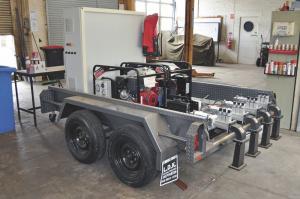2013 - Volume #37, Issue #4, Page #03
[ Sample Stories From This Issue | List of All Stories In This Issue | Print this story
| Read this issue]
Microwave Weed Zapper
 |
Dr. Graham Brodie, an electrical engineer at the University of Melbourne, developed his microwave weed zapper as a solution to Australian grain farmers’ problems with herbicide resistant weeds.
“Some weed species have developed multiple resistances to different chemical groups, which means that control of weed infestations has become very difficult,” Brodie says.
He has 30 years experience with microwave energy, including a project to speed up drying green timber. “The microwave treatment creates tiny steam explosions through the weed plant that causes it to die,” he explains.
His prototype is set up on a 5 by 8-ft. trailer with four 2kW microwave generators powered by portable generators. “Horn antennae drape over the back of the trailer and are designed to go between the rows of the crop,” Brodie says. “It’s also possible to do a blanket ‘knock down’ before sowing or crop emergence. Because the microwave treatment destroys the cells in the weed, it basically kills the plant.”
His weed-killing machine is still in early development stages. Brodie says his next step is to develop a shielding system so the operator won’t be exposed to microwave energy, which can cause tissue heating and possible burning with long exposure.
More research is also necessary regarding how microwave energy affects the soil. So far, it appears to “pasteurize” the first couple inches of soil, without significant effect on fertility and nutrients. Soil bacteria were only affected temporarily.
In initial testing, application was slow (walking pace), but a more powerful 15-kW unit would speed up the process to be comparable to chemical spray application, with less than a second of exposure required to kill weeds.
The non-chemical method appeals to farmers, and there have been inquiries from manufacturers.
“I am hopeful that a more commercial prototype system may be available in the next 3 to 5 years,” he says.
Contact: FARM SHOW Followup, Dr. Graham Brodie, Dookie Campus, University of Melbourne, Nalinga Rd., Dookie, Victoria, 3647, Australia (ph 61 3 5833 9273; grahamb@unimelb.edu.au).

Click here to download page story appeared in.

Click here to read entire issue
To read the rest of this story, download this issue below or click here to register with your account number.




